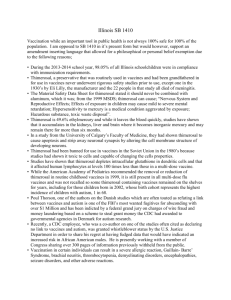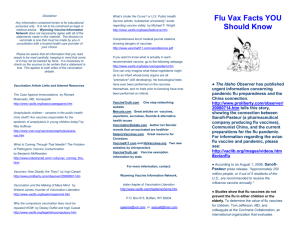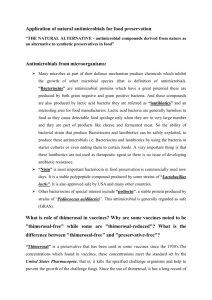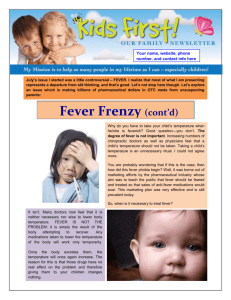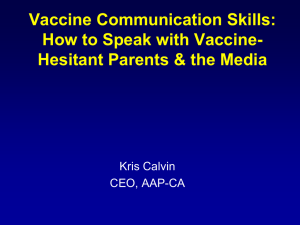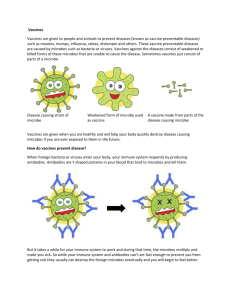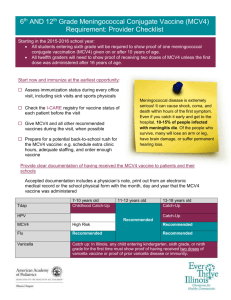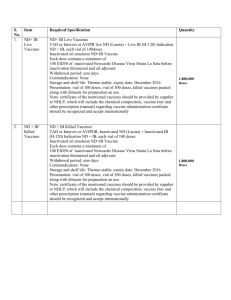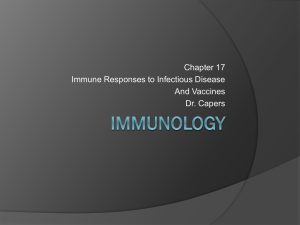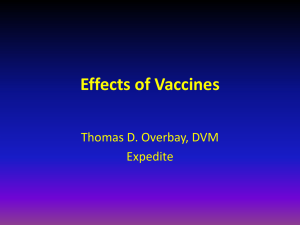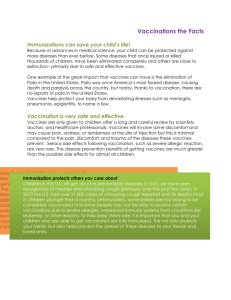Vaccines-Are They Right for You1
advertisement
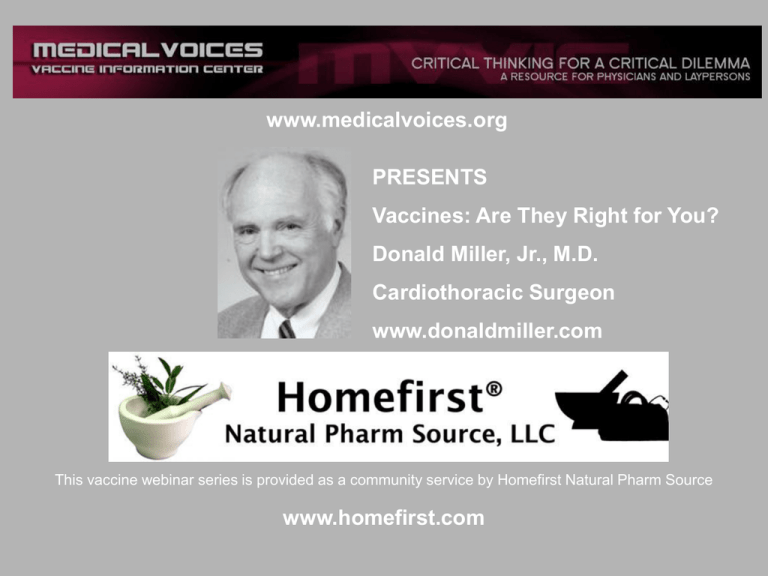
www.medicalvoices.org PRESENTS Vaccines: Are They Right for You? Donald Miller, Jr., M.D. Cardiothoracic Surgeon www.donaldmiller.com This vaccine webinar series is provided as a community service by Homefirst Natural Pharm Source www.homefirst.com Harmful Effects of Mercury • Neurotoxic -- damages brain cells – Breaks DNA, damages membranes, activates Caspase-3 causing apoptosis (cell death) – Produces the same pathologic hallmarks experimentally as that seen in Alzheimer’s disease – Testosterone enhances it • Poisons (antioxidant) enzymes – Catalase, SOD, glutathione peroxidase • Glutamate-induced excitotoxicity – Interferes with its removal from extracellular space • Interferes with energy production – Accumulates in mitochondria Vaccine-Related Causes of Childhood Disease and Autism • Thimerosal – 50% ethyl mercury • Other Preservatives, Stabilizers, and Adjuvants – Aluminum, Formaldehyde, Antibiotics, Triton-X, Ethylene glycol • Crowded vaccine schedule – Too many vaccines given too close together at too young an age • Live virus vaccines – Virus-induced autoimmunity Vaccines and Childhood Diseases 1960– 4 vaccines (plus boosters) before entering school 2008 – 21 vaccine antigens (plus boosters) before school Disease 1960 2008 Autism 1 in 10,000 1 in 38 boys, 1 in 150 girls Type 1 Diabetes 1 in 7,100 1 in 400 Juvenile Rheumatoid Arthritis So rare, no statistics 300,000 Asthma → a 4-fold increase A User-Friendly Vaccination Schedule – No vaccinations until a child is two years old. – No vaccines that contain thimerosal (mercury). – No live virus vaccines (except for smallpox, should it recur). – These vaccines, to be given one at a time, every six months, beginning at age 2: • • • • Pertussis (acellular, not whole cell) Diphtheria Tetanus Polio (the Salk vaccine, cultured in human cells) An Update on this Vaccination Schedule (2005) posted at: www.donaldmiller.com In the newsletter New Developments: New Angles on Developmental Delays (Spring 2005, Vol. 10, No.3), the following entry is in its News and Comments section (p 3), titled “Friendly Vaccine Schedule Encounters a Glitch." It says, "Dr. Donald Miller, author of the ‘User Friendly vaccine Schedule’ published in the last newsletter [Copywrite LewRockwell.com in 2004], has discovered that the D and T of the DPT are no longer available separately, without thimerosal. Unless the vaccine manufacturers can be pressured to make separate thimerosal-free D, T, and P vaccines, it will be impossible, unfortunately, to follow the ‘user friendly’ vaccination schedule as written. Miller believes that the risk of the combined DPT vaccine, even after age two, outweighs its benefits, so it is better to do without these shots.” In my research on this subject, I was persuaded that Dr. Russell Blaylock is correct in recommending that vaccinations only be given after the age of two, one at a time, and no closer than six months apart--and that a "user friendly" schedule should include only D, T, P and polio, the four "traditional" vaccines. I did not think before writing the article to ascertain (assuming it to be the case) that one could indeed obtain separate D, T, and P vaccines without thimerosal. On further investigation I have found that T and D can be obtained separately, but they contain thimerosal/mercury. GlaxoSmithKline made a separate pertussis vaccine for the APERT trial, but apparently no longer does so. A Japanese company is said to make one (?without thimerosal), but I cannot determine who it is. If your pediatrician can obtain single-dose vials of D and T then those would have only an inconsequential trace of thimerosal, but they are apparently hard to find as well. That leaves only the polio vaccine. For a good discussion of why one should avoid most vaccines on the CDC's schedule I recommend Dr. Sherri Tenpenny's (3-hour) DVD titled "Vaccines: the Risks, the Benefits, the Choices." (Amazon.com has it, as do other sites.). My Response to Emails About “A User-Friendly Vaccination Schedule” Unfortunately, most orthodox (allopathic) pediatricians suffer from what is called "negative cognitive dissonance." This is the "inability or disinterest in processing new, unexpected or unwanted information," as the medical journalist Michael Culbert squarely puts it. In medical school, students are indoctrinated on the value of vaccines, and by the time pediatricians (along with other physicians and surgeons) have finished their training they have become prisoners of the vaccine paradigm. Very few conventional doctors (M.D.s and D.O.s) have been able to break out of this ideological prison. It is very hard to find a M.D. pediatrician anywhere who has an enlightened view of vaccines. A substantial part of their office income comes from giving vaccinations on well baby visits. Without needing to follow the CDC's vaccination schedule, why take a healthy baby to see a doctor? ACIP Recommendations on Flu Shots Year Recommendation Number of Americans 1999-2000 Over age 65 36 million 2000-01 Over age 50 77 million 2002-03 Children 6-23 months old 2004-05 6 months-5 years old 2008-09 6 months-18 years old 256 million Guillain-Barré Syndrome An acute inflammatory neuropathy, caused by autoimmune-mediated demyelination of peripheral nerves occurring 2-4 weeks after vaccination Guillain-Barré Syndrome One woman’s experience with GBS following a flu shot: After spending 16 months in the hospital paralyzed on a ventilator and life support and several subsequent multi-month hospitalizations, she writes: "On my last visit to my neurologist I was able to walk about 6 feet holding his hand, not much but it took years to be able to do that. I scratch my head when I hear them promoting flu shots… Most people that I come into contact with – in the hospital and out (nurses, doctors, and regular people) – after hearing my story, feel that it is better to chance the flu and not get the shot." Neil Miller, Vaccine Safety Manual for Concerned Families and Health Practitioners: Guide to Immunizations Risks and Protection (2008, page 86) Seasonal Variation in 25-hydroxyvitamin D Levels in People at Latitude 48° N Cannell JJ, etal. Epidemic influenza and vitamin D. Epidemiol Infect 2006;134:1129-1140. Macrophage Noncalcemic Functions of 1,25-dihydroxyvitamin D Cytokines Adaptive Innate Immune modulation Immunomodulatory Effects of 1,25-dihydroxyvitamin D (Calcitriol) Benefits of Vitamin D • Skeletal-muscular – Strong muscles and bones • Infections – Prevent influenza, treat tuberculosis • Cancer – Prevent breast, colon, and prostate cancer – ? Suppress metastasizes • Autoimmune Diseases – Prevent multiple sclerosis and type 1 diabetes • Cardiovascular Disease – Slow progression of atherosclerosis – Treat hypertension and congestive heart failure • Neuropsychiatric Disorders – Prevent schizophrenia and relieve depression 25-hydroxyvitamin D3 Blood Levels Calcium Absorption Severely deficient < 8 ng/ml Deficient 8-19 ng/ml Insufficient 20-29 ng/ml Sufficient 30-49 ng/ml Optimal Excessive Toxic 50-99 ng/ml 100-150 ng/ml >150 ng/ml (1 ng/ml = 2.5 nmol/L, 1 nmol/L = O.4 ng/ml) 32 ng/ml PTH Levels Sources of Vitamin D Cholecalciferol (D3) and Ergocalciferol (D2) Dietary Natural Salmon (wild, 3.5 oz) Salmon (farmed, 3.5 oz) Cod liver oil (1 tsp) Tuna (canned, 3.6 oz) Egg yolk 800 IU D3 150 IU D2 or D3 400-1100 IU D3 230 IU D3 20 IU D 2 or D3 Fortified Foods Milk (8 oz) 100 IU D3 Orange juice (8 oz) 100 IU D3 Infant formula (8 oz) 100 IU D3 Butter (3.5 oz) 50 IU D3 Breakfast cereals/serving 100 IU D3 Skin synthesizes 20,000 IU D3 in 20 minutes when exposed to sunlight Supplements Prescription Ergocalciferol (D2) 50,000 IU/capsule Over the Counter Multivitamins Cholecalciferol (D3) 400 IU D2 or D 3 400, 800, 1000, 2000, 5000 and 50,000 IU/tablet 5,000 IU D3 50,000 IU D3 OTC at vitalady.com, lifespannutrition.com Smallpox Vaccine-related articles on www.donaldmiller.com “Mercury on the Mind” “A User-Friendly Vaccination Schedule” “Vitamin D in a New Light” “Avoid Flu Shots, Take Vitamin D Instead” “Arm-to-Arm Against Bioterrorism”
